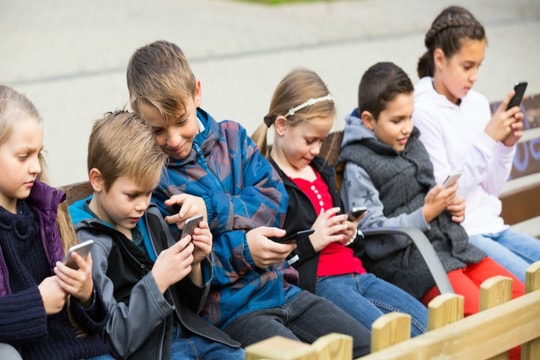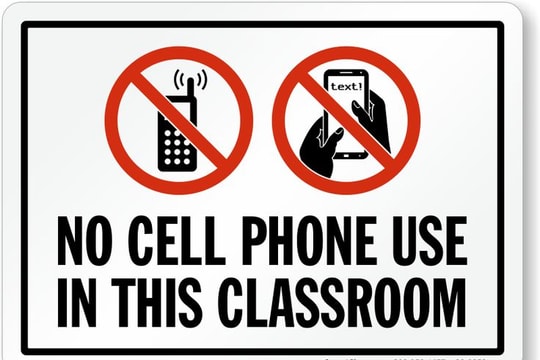UNESCO calls for ban on mobile phones in schools globally
In order to create a more effective learning environment, the United Nations Educational, Scientific and Cultural Organization (UNESCO) has called on schools to ban students from using mobile phones in schools.
Many studies have shown that the overuse of mobile phones is closely linked to the decline in academic performance in children. Spending too much time on applications and games on the phone distracts children, making it difficult to concentrate on studying, reducing their ability to remember and do homework.

Furthermore, using mobile phones late at night before going to bed also affects the quality of sleep, making children tired and unfocused the next day, thereby indirectly negatively affecting learning outcomes.
Direct interaction between teachers and students remains the core element in the learning process.
UNESCO asserts that banning mobile phones sends a clear message that face-to-face interaction between teachers and students remains a core element of the learning process. Technology, including artificial intelligence (AI), must serve the goal of human-centered education and cannot replace the role of teachers.
In the digital age, the overuse of technology in education can lead to students being passive, lacking communication skills and critical thinking. Therefore, putting people at the center, with direct interaction between teachers and students, is still necessary to ensure the quality of education.
UNESCO urges policymakers to be cautious when adopting digital technology, as not all changes are progressive. It is necessary to ask whether this is really necessary and beneficial to society. The organization warns that the thoughtless adoption of digital technology can lead to unintended consequences, such as widening the digital gap between rich and poor, violating privacy and undermining traditional cultural values.
In the context of the increasing popularity of online learning, especially at the university level, UNESCO warns policymakers not to overlook the importance of face-to-face learning. Direct teacher-student interaction plays a vital role in the holistic development of students, and an over-focus on personalized learning can detract from the core values of education.
“Just as we need strong regulations to manage the digital revolution in society, the use of digital technologies in education requires the same attention,” said UNESCO Director-General Audrey Azoulay. “The potential of the digital revolution is limitless, but we need to ensure that it is used effectively and safely in learning environments.”
“The goal of using technology in education is to enhance the learning experience, bringing joy to both students and teachers. Technology should be used to support the teaching and learning process, not to create additional burdens. We must always put the needs of learners first and create the most favorable conditions for teachers. However, no technology can completely replace direct human interaction,” Ms. Audrey Azoulay added.
According to the UNESCO report, countries need to set specific goals and principles when applying digital technology in education. This is to ensure that technology not only benefits students but also protects their rights, contributing to building a democratic and humane society.
Excessive or inappropriate use of technology by students in the classroom and at home, whether it be smartphones, tablets or laptops, can be distracting, disruptive and have a detrimental impact on learning, the report said. It also cited large-scale international assessment data showing a “negative association” between excessive digital technology use and student achievement.
The report finds that digital technology opens up new learning opportunities, but the benefits are not shared equally. Millions of poor people around the world are still left behind because they lack the physical and financial resources to access technology.
UNESCO’s Global Education Monitoring Report 2023 found that there is currently little credible scientific evidence to support the effectiveness of digital technologies in improving education quality. Most of the relevant research is funded by technology companies, which raises questions about the objectivity of the results.
Many countries around the world have issued regulations banning or restricting the use of mobile phones in schools.
UNESCO said countries around the world have become more aware of the importance of prioritizing learners in the process of applying digital technology to education. To illustrate this, UNESCO cited the example of China, where the government has issued regulations limiting the time spent using digital devices in teaching, allowing only a maximum of 30% of total learning time. At the same time, students are required to take regular breaks to avoid prolonged exposure to screens.
The report acknowledges that online learning has been crucial in keeping education running as schools and universities have been closed due to the COVID-19 pandemic. It is estimated that more than a billion students globally have switched to online learning during this time. However, the article also points out that millions of students, especially those from disadvantaged families without access to the internet, have been left behind.
Banning mobile phones in schools is becoming a widespread trend, according to a UNESCO study of 200 education systems around the world. An estimated one in four countries has enacted specific laws or guidelines to restrict students from bringing phones to school.
France is a prime example, having implemented this policy since 2018. The Netherlands has also joined the trend, implementing similar restrictions starting in 2024. Greece and Italy have also banned mobile phones in schools, and Germany is considering a similar move. A recent study by the Organisation for Economic Co-operation and Development (OECD) recommended limiting mobile phone use in schools.
In announcing the ban on mobile phones in schools, Dutch Education Minister Robbert Dijkgraaf stated: “Students need a focused learning environment and we need to create the best conditions for them to learn. Scientific studies have shown that mobile phones are a major distraction. Therefore, we need to protect students from these negative influences.”
In 2021, former UK Education Secretary Gavin Williamson made a controversial proposal calling for a complete ban on mobile phones in schools, which he said was a drastic measure to improve student discipline and the quality of education.
However, the proposal has been met with strong opposition from education unions, who say banning phones is a “diversion” and does not address the root problem of school discipline. They argue that many schools have effectively implemented smartphone policies for years.
Mobile phone policies in secondary schools in the UK vary widely and are at the discretion of individual headteachers. However, most schools require students to turn their phones off and put them away during lessons, extracurricular activities and when travelling around the school grounds.
The use of mobile phones is only allowed in special circumstances, such as during class time when teachers have given permission to use them as a learning aid. If students violate the rules, their mobile phones may be confiscated and they may face various forms of disciplinary action, depending on the severity of the violation.
Geoff Barton, General Secretary of the Association of School and College Leaders in the UK, has confirmed that most schools here have very strict policies on the use of mobile phones. Accordingly, students are usually banned from using their phones during school hours. Only in some special cases, with the permission of teachers, can students use their phones for learning purposes.
“A complete ban on mobile phones on school grounds raises a number of practical concerns. Firstly, parents will have difficulty contacting their children in case of emergency, especially when students travel between school and home by public transport. Secondly, many students now use their phones to pay for public services. Banning phones will cause inconvenience and affect their daily lives,” Mr. Geoff Barton added.
Although aware of the negative impacts that mobile phones can have on students, such as cyberbullying and mental health problems due to excessive screen use, Mr. Geoff Barton believes that completely banning mobile phones in schools is not the optimal solution, but more comprehensive measures are needed to effectively manage the use of these devices.






